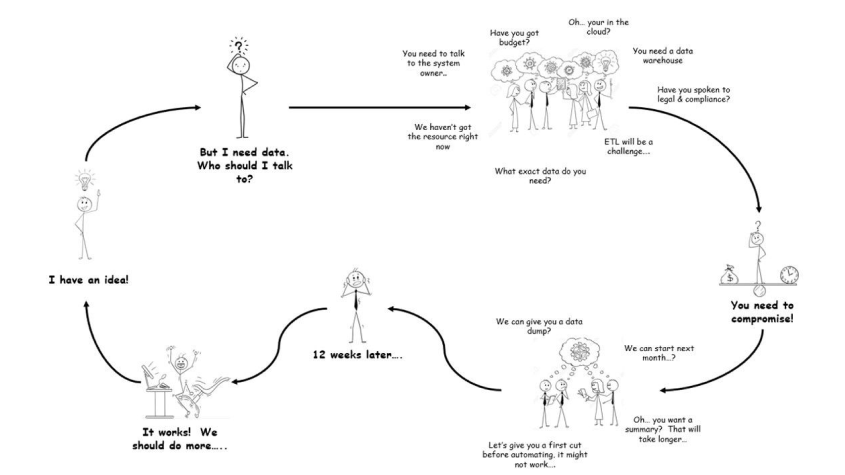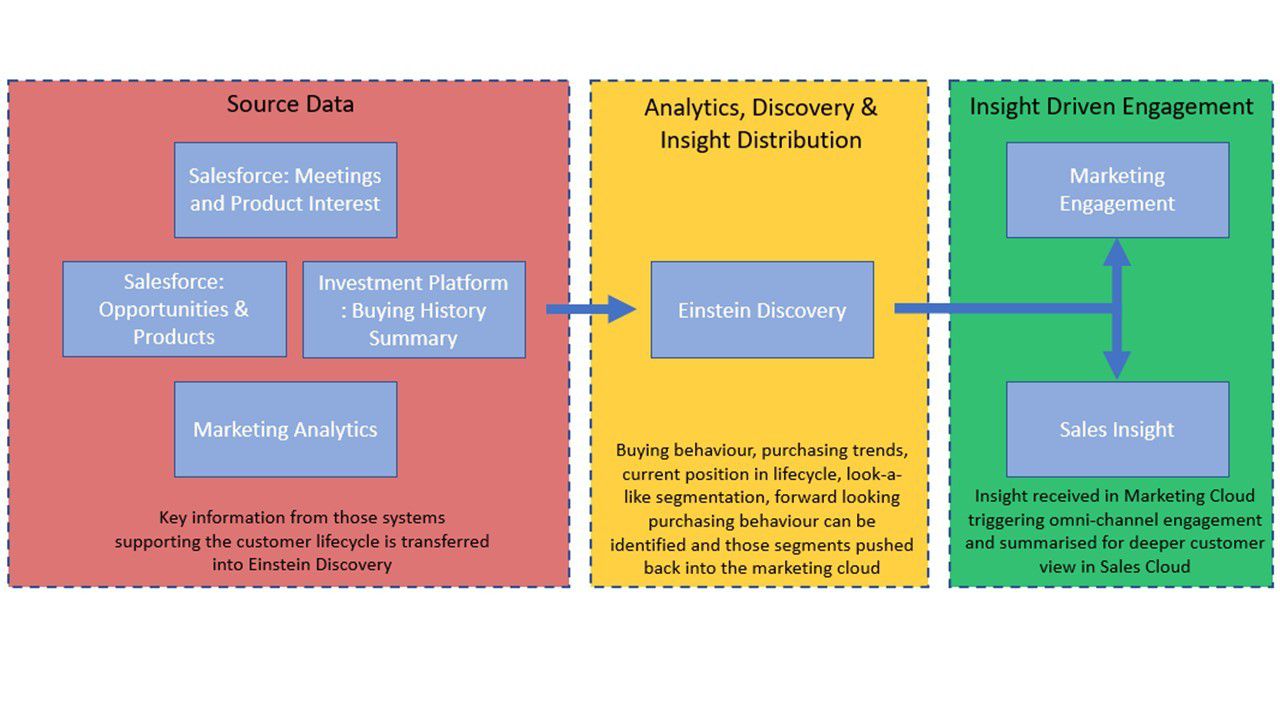Improving marketing engagement using actionable intelligence
By Matt Baker - July 10, 2020
Consistent, timely, engaging and relevant content is the key to modern marketing. GDPR and similar regulations have made consumer consent a prized commodity and one that should not be put at risk through poor marketing engagement and content. The days of newsletter campaigns and generic offers have long since passed.
The challenge for Marketing teams now is to understand how to engage each and every consumer in a manner that they accept and promote potential sales, up-sell and cross sell opportunities. To do this successfully, teams not only need data but forward looking insight into customer behaviour.
In my experience the primary issue faced by any Marketing Team attempting to become data and insight driven is access to often previously silo’d data in a usable format. It’s not long before a Marketing exercise becomes a Data Engineering exercise and time, costs and resources are increasing exponentially. Is this familiar?
Often, by the time the required data has been located, transformed, analysed and provided as a “one off extract for testing” the opportunity has passed. The data is received too late, it’s out of date, now the wrong season or potential supporting offers have expired.
If the project was a success, there are still things to do… Most importantly the team will have changed the way they engage prospects and customers which will mean everyone will learn something new and want to adapt. This means beginning the lengthy cycle again.
This is not agile, it does not provide marketing teams with the ability to test theories, experiment, A/B test and certainly does not give them the ability to produce forward looking insight on demand.
Ultimately it restricts creativity and innovation.
To move forward, increase agility and reduce costs we need to reduce the cycle and those involved in the process. Let’s get the data and tools into the hands of those who know what they want from it.
Salesforce has provided a very effective platform to do just that, with a combination of Marketing Cloud, Einstein Discovery and the Mulesoft platform.
Two primary blockers are addressed through the use of this platform.
- Data and system connectivity to the marketing and analytics platform. A great deal of effort is often spent building large data lakes to house data for reporting and analytics purposes but it is very difficult to transform the results into actionable intelligence. The data is in the wrong place, in the hands of the wrong team and not in a format that will work for Marketing. Mulesoft can ensure that data is distributed in near real-time to Einstein.
- Einstein Discovery, underpinned by Watson AI, is a powerful analytics tool that has out of the box integration with Sales Cloud and Marketing Cloud. This means that the results of any analytics can be immediately pushed to Marketing Cloud for action whether this be manual or automated.
You now have actionable intelligence that can be amended, tweaked and experimented with in Marketing Cloud and you didn’t have to wait 12 weeks to get it.
A Real-Life Example
All this sounds great in theory but what about a real-life example?
I spent many years working with Financial Services organisations who had a great deal of trouble aligning their Sales and Marketing efforts. Sales teams were targeted to sell specific funds and Marketing were challenged to support this effort. However, in many cases the tools used by the teams were very different and obtaining relevant data across the customer life-cycle was impossible.
The solution was to bring life-cycle data into a single tool that could push data to Marketing Cloud. A transformation in Marketing and Sales collaboration.
Marketing oriented their approach around where customers were in their life-cycle, whether this be initial meetings around available products, their sentiment to products, buying history and comparative trends.
Once Marketing had good insight into what customers were interested in and buying, they developed targeted events and campaigns that helped support their sales colleagues and provide a unified message.
Marketing could now automatically engage prospects and customers based on real-time data and adapt engagement as conversation through the sales cycle occurred. Einstein AI can begin to predict next best actions and drive engagement without the need for complex and timely manual analytics.
How It Works
MuleSoft has great out-of-the-box plug-ins to Einstein, Sales Cloud and Marketing Cloud. Customertimes can help set this up and serve as a resource to help you get the most out of it in the shortest amount of time.
Once MuleSoft is up and running, the platform helps you identify the data sets you want to track: meetings, opportunities, purchases, SKU numbers, dates, amounts, etc. You define the marketing data sets you’re looking for; MuleSoft imports that to Einstein.
The next step is to set up modelling. This is a bit more complex – ideally Customertimes will help set this up for you – but modelling correctly is worth the extra effort because it helps you understand how to use the data you’re collecting to solve your most pressing challenges.
Customertimes will work with you to determine KPIs and set the dashboard so you’ll have easy access to your data. Once the integration is complete, it’s all right there, and your team can begin to experiment and try new things (again, without the massive pressure they were experiencing before).
The final step is to choose those insights that you want to action. Einstein Discovery can then automatically push your new segments and trends as data directly into Marketing Cloud to trigger automated journeys to communicate across email, mobile, SMS, social and digital platforms and control content directly on your website. AI-powered Einstein Analytics will start to predict behaviours, so you have the tools in place to market from a proactive position rather than a reactive one. Over the long term, you can start to identify patterns and use that insight to deliver a better customer experience.
Conclusion
Marketing teams should not be worried about data management programs. Their attention should be on customer engagement and modelling behaviour, and they should have tech platforms in place that give them the freedom to experiment and innovate.
Actionable intelligence is not just a possibility. It’s a necessity in today’s business climate, and you don’t need a data scientist or a 12-week turn-around time to get it done. A trusted partner like Customertimes can help you implement MuleSoft and Einstein Analytics and set up the modelling for you enabling your Marketing Ops team to have real-time access to the data insights they need to be successful.
To get started, please reach out to us. We’d love to help make this a reality at your organisation.
This post was originally posted on LinkedIn.
-fm-converted.png)
Matt Baker
Matt Baker, Director, Customertimes UK, is a highly experienced and versatile CRM/Customer Experience specialist with more than 20 years of experience in CRM technology and consulting. Matt works with national and international organizations, helping them implement CRM technology and develop a vision and strategy for using it to compete in the ever-changing, challenging global business environment. Matt’s expertise includes financial services, engineering, media, and more, and he’s recognized for his ability to design and build high-quality enterprise-class cloud CRM platforms.
-fm-converted.png)
Overcoming Apprehension around Emerging Technologies
-fm-converted.png)
How to navigate the challenges of implementing innovative tech in healthcare
-fm-converted.png)
How AI is Improving the Work of Pharma Sales Reps
-fm-converted.png)
Insurance Fraud: Facing Up to the $300 Billion Problem
-fm-converted.png)
Keeping Up With Consumer Expectations in the Financial Services and Insurance In...
-fm-converted.png)
Navigating Data Engineering Challenges in the Insurance Industry
-fm-converted.png)
AI's not so nice side: Key concerns businesses are thinking about
-fm-converted.png)
What’s the difference between Monolithic and Microservices architecture?
-fm-converted.png)
Artificial Intelligence: Is it a Force for Good in Business?
-fm-converted.png)




